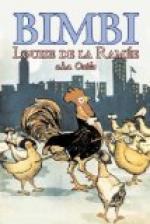The stove, no doubt, had stood in palaces and been made for princes, had warmed the crimson stockings of cardinals and the gold-broidered shoes of archduchesses, had glowed in presence-chambers and lent its carbon to help kindle sharp brains in anxious councils of state; no one knew what it had seen or done or been fashioned for; but it was a right royal thing. Yet perhaps it had never been more useful than it was now in this poor, desolate room, sending down heat and comfort into the troop of children tumbled together on a wolfskin at its feet, who received frozen August among them with loud shouts of joy.
“Oh, dear Hirschvogel, I am so cold, so cold!” said August, kissing its gilded lion’s claws. “Is father not in, Dorothea?”
“No, dear. He is late.”
Dorothea was a girl of seventeen, dark-haired and serious, and with a sweet sad face, for she had had many cares laid on her shoulders, even whilst still a mere baby. She was the eldest of the Strehla family; and there were ten of them in all. Next to her there came Jan and Karl and Otho, big lads, gaining a little for their own living; and then came August, who went up in the summer to the high alps with the farmers’ cattle, but in winter could do nothing to fill his own little platter and pot; and then all the little ones, who could only open their mouths to be fed like young birds,—Albrecht and Hilda, and Waldo and Christof, and last of all little three-year-old Ermengilda, with eyes like forget-me-nots, whose birth had cost them the life of their mother.
They were of that mixed race, half Austrian, half Italian, so common in the Tyrol; some of the children were white and golden as lilies, others were brown and brilliant as fresh fallen chestnuts. The father was a good man, but weak and weary with so many to find for and so little to do it with. He worked at the salt furnaces, and by that gained a few florins; people said he would have worked better and kept his family more easily if he had not loved his pipe and a draught of ale too well; but this had only been said of him after his wife’s death, when trouble and perplexity had begun to dull a brain never too vigorous, and to enfeeble further a character already too yielding. As it was, the wolf often bayed at the door of the Strehla household, without a wolf from the mountains coming down.
Dorothea was one of those maidens who almost work miracles, so far can their industry and care and intelligence make a home sweet and wholesome and a single loaf seem to swell into twenty. The children were always clean and happy, and the table was seldom without its big pot of soup once a day. Still, very poor they were, and Dorothea’s heart ached with shame, for she knew that their father’s debts were many for flour and meat and clothing. Of fuel to feed the big stove they had always enough without cost, for their mother’s father was alive, and sold wood and fir cones and coke, and never grudged them to his grandchildren, though he grumbled at Strehla’s improvidence and hapless, dreamy ways.




